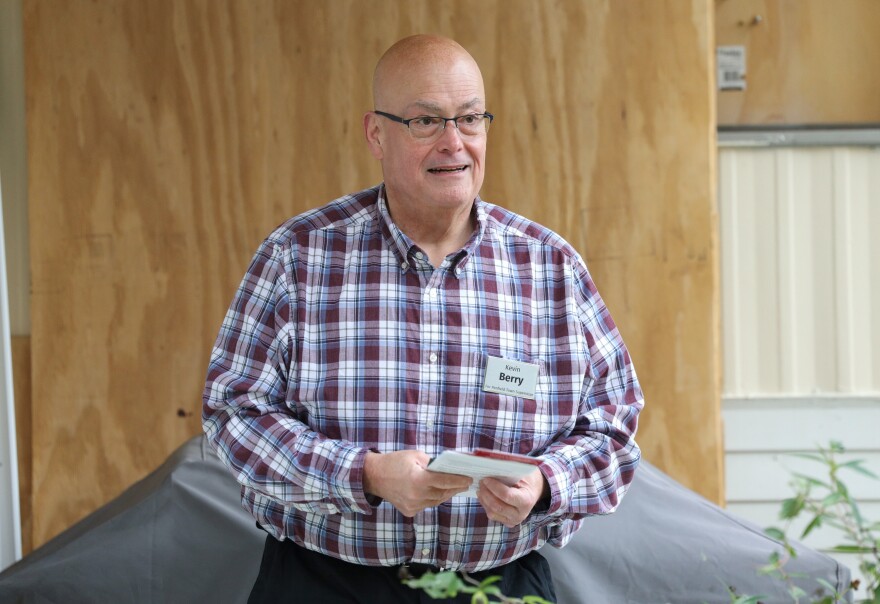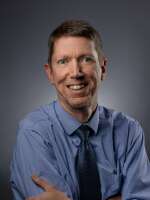Voters head to the polls next week in an off-year election that is seeing a record number of lesbian, gay, bisexual, trans and queer candidates nationwide.
And in Monroe County.
“This is, I think, probably the highest number that have gotten to the full general election,” said New York state Assembly member Harry Bronson, D-Rochester, speaking specifically of Monroe County. “But the trend definitely has changed over the last few cycles of elections, locally.”
The non-partisan Victory Fund political action committee is tracking 250 openly LGBTQ+ candidates across the country. And next year is shaping up to see far more.

Here in Monroe County, more than a half-dozen LGBTQ+ candidates are on the ballot, from Rush to Webster, and Rochester to Penfield and Perinton. Most are on the Democratic line, running in races from town board to town justice, City Council to town clerk and town supervisor.
Early voting started Saturday and continues through Sunday. Election Day is Nov. 4.
“There's not a lot of us. I mean ... it is the most that we've had, but given the number of offices, it's still a small amount,” said Perinton town clerk candidate Andrew Gilchrist. “But I think that the same could have been said, you know, 40 years ago about women in politics, and to see the change that that's motivated. I think this is a good step.”
But, he added, “My real driver really, is about creating more equity and inclusion across all different types of people.”
It was 40 years ago, in 1985, that Tim Mains won election to Rochester City Council, becoming the first openly gay elected official in New York state. Last week, Assembly member Deborah Glick of Manhattan, the first openly gay person elected to statewide office, announced she would retire at the end of her term next year, after 35 years in office.
This is not an issue, though, that is front-and-center in campaigns. Candidates don’t shy from the topic but identity politics is not top of mind.
“I don't want to be known as the gay town council person, or the gay supervisor,” said Kevin Berry, a Democrat in his first term on the Penfield Town Board who is running to unseat Republican town Supervisor Jeffrey Leenhouts.

In that, Berry echoes Mains from decades ago.
“Really, I want to be known for ... my personality and my views and those kinds of things,” Berry continued. “I wish that it wasn't even an issue at all. But obviously, you know, in today's society, that is an issue.”
Changing times
James Smith, who served briefly as Rochester mayor at the end of 2021 — the city's first openly gay mayor — sees this as a bellwether moment. Not just for the number of candidates, he said, but the breadth of towns and offices in play.
"Times can change," Smith said. "And thank god for that."
Nationwide, the Victory Fund has tallied 80 LGBTQ+ candidates lining up to run for Congress in 2026 — among the more than 300 candidates the Victory Fund has endorsed across all races, said Daniel Hernandez, vice president of political programs with the Victory Fund.
The goal is to double or triple the number of openly LGBTQ+ members of Congress, he said. Today, there are 12.
“We are trying to show people that running as an LGBTQ person is not a detractor,” Hernandez said, adding: “New York is way ahead of the game in a lot of ways from other places, where we are still looking at electing the first or the only.”
Bronson was the first openly gay member of the Monroe County Legislature, and in 2010, he became the first openly gay state legislator elected outside of New York City.

“I’m in my 20th year of elected office,” he said. “There was a time when I was asked to leave people's porches. There was a time where slurs were spoken to me when I was at the door trying to talk to folks that I wanted to represent.”
He sees less of that now, in Rochester and across New York state.
Contrast that with what he describes as “the permission to hate and the permission to use hateful language” that is fueling divisions nationally — causing some to step back, he said, but motivating many to step forward.
On this year’s ballot, there are a number of first-time candidates, though most, if not all, have been active behind the scenes for years.
“The trend is that we're having more and more members of our community who are seeing the need to run,” Bronson said, “seeing the need to be a voice for our community — not only as a voting citizen or someone who would go to rallies or be an advocate or activist, if you will, but actually be someone who's going to be at the table.”
And the value of being at the table, he said, cannot be understated.
“Marriage equality would not have happened if we weren't at the table,” he said, and lists other measures from the Sexual Orientation Non-Discrimination Act and Shield Law to protections for older LGBTQ+ people. "Those kind of measures would not get the traction they do get here in New York without having our voice at the table, without having the LGBTQ+ voice at the table.”
The U.S. Supreme Court has a private conference scheduled for Nov. 7 to decide whether to take up a challenge to same-sex marriage rights.
A reason to run
Gilchrist first ran for office in 2018, losing his bid for state Assembly to the Republican incumbent, Mark Johns.
“I'm kind of over politics as usual. That's been happening for most of my life. I was ready to see change within our system,” Gilchrist said of what first motivated him to seek elected office. "I felt like I needed to run in order to be part of that change.”
This election, he is running against Republican incumbent Town Clark Janelle Reed.
“This go-around, it's a little different,” he said. “My husband is actually an immigrant.”
Gilchrist’s husband is originally from Brazil. And while he has his green card, Gilchrist said, they see the nationwide crackdown on immigration and how that has unfolded.
“And the fact that we, you know, we are a gay couple,” he said.
“I think a lot of people feel like almost threatened, in a way, about loss of rights and our loss of our freedoms,” he said, describing a decades-long slide from democracy that has only been amplified of late. “For me, I looked at it as this was kind of a smaller way to fight back, by getting involved with local politics.
“But it still stems also from the desire for change.”
On a larger scale, Bronson attributed the growing candidate field to “grassroots work that has been done over the past couple of decades to get us to this point.”
And the Monroe County Democratic Party is taking a cue from that history, bringing what have been various iterations of an LGBTQ caucus in-house, and replicating that across other demographic groups. Party officials see it as a means of providing a welcoming path into the party, a place for shared experiences to be heard, a means to elevate those voices, and to grow the bench of future candidates.

Back in Penfield, one of the reasons Berry first ran for town office was because, yet again, it didn’t look like any other Democrats would be. That, and concern about the fate of the historic Alpheus Clark House. Too often, though, there hasn’t been much choice at the ballot box, he said — noting that the town hasn’t elected a Democratic supervisor in over 40 years.
“When it comes to LGBTQ+ candidates, you know, I think really, every candidate has their own reasons why they run,” he said.
Asked later in the interview if there was anything more he wanted to add, he paused.
“You know, the one type of person that I want to know that I am, like, the gay supervisor is the little kid who doesn't have anybody to identify with,” he said. “I was interested in politics from the time I was a little kid. And I really didn't think that I would ever get involved in politics, even though I was a political science major, because I was from a very conservative area in northern New York, and I didn't believe at that time that gay people got elected to office.
"Since I've been in office, I've had people who were young who said, ‘I'm glad that you're there. I feel now like I belong in this town, because I see you on the town board.’ Those are the people who I want to be thinking of me in terms of being gay. Just people who belong because they see other people who are doing completely regular things, like being on the town council, and the fact that they're gay doesn't matter.
“So aside from that,” he said, “I don't think that it really should matter all that much.”




